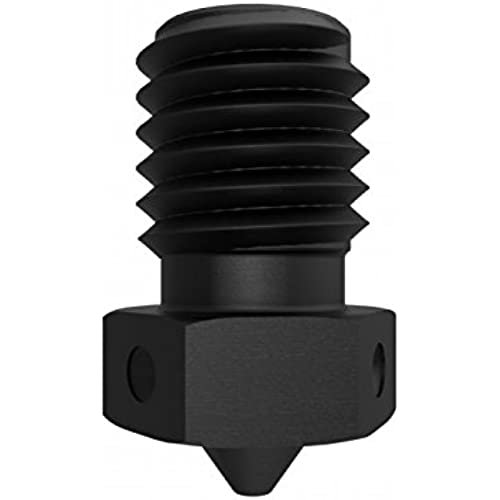
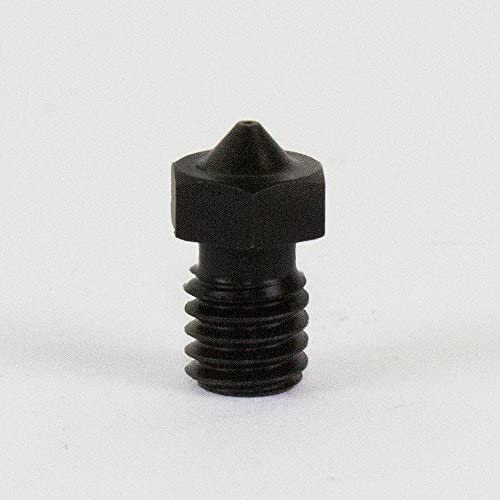
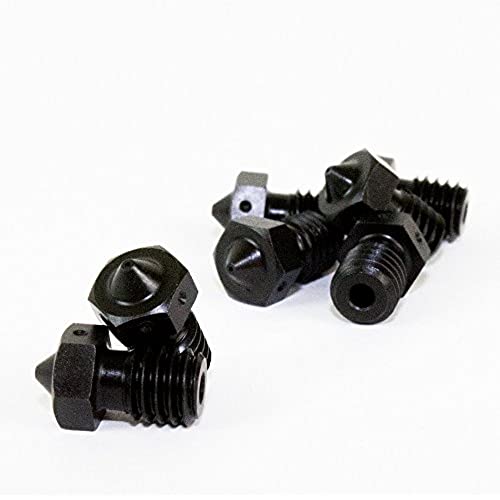

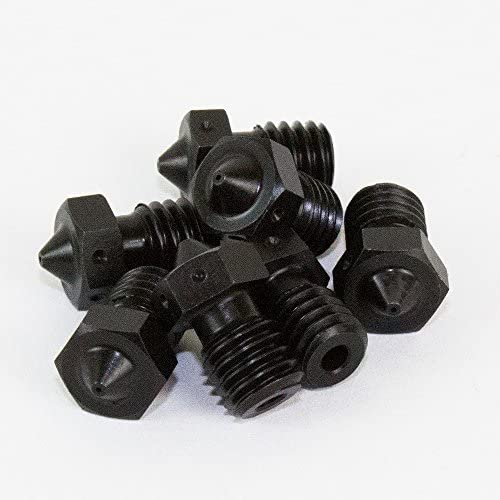
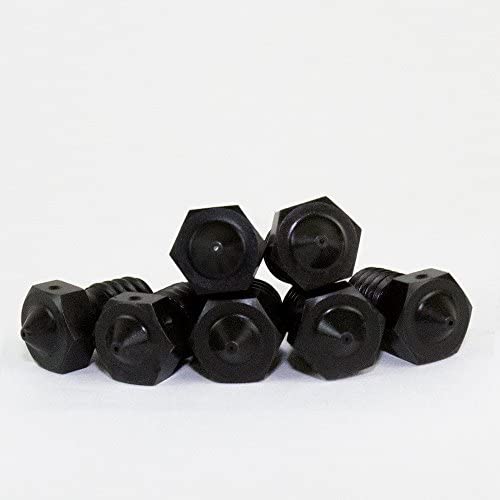






Genuine E3D Hardened Steel Nozzle V6 (1.75mm) 0.40mm (V6-NOZZLE-HS-175-400)
-

Discover
> 24 hourThis is really well made as expected from E3D. In warmer weather, I was printing everything normally, maybe adding 5 degrees to the standard filament settings in my slicer to compensate for the steels lower heat transfer, and was planning to just leave this on permanently. But as colder weather has set in and the ambient temperature in the room has cooled off, Ive had a lot of issues with clogging even at 20 degrees or more above the original settings, especially in prints with large flat areas. This can also be compensated for by slowing down to allow the steel nozzle more time to heat the filament but personally, Im switching back to brass for the winter.
-

Q
> 24 hourI usually use this nozzle to print things like wood impregnated filaments or glittter or what have you. I have not tried anything like carbon or glass impregnated nylon yet, but I will likely get E3Ds new nozzle when I upgrade one of my machines to handle nylon.
-

David Bixler
> 24 hourUpdated 12/2/2020 - 0400 OK, lets review. Stringing, clogs, jams, etc. Why? Well, lets be realistic. What do people tell you to do when you have stringy / blobby prints? Dial back your temps, dial up retraction. Right? That sucks. Dont do those things. Dial up your temps. Odds are with PETG youre about 15c too low from stock Prusa Slicer or Slic3r PET settings. THERMAL RUNAWAY (?) Kapton tape is your friend! You could order E3D silicone socks for a prettier solution, but a bandaid-sized strip of kapton tape wrapped around the heat-block (ABOVE the nozzle). Remove the extruder/nozzle fans, the nozzle fan shroud, wrap tape, attach shroud and fans. BOOM done. This protects the thermistor from the nozzle fan blowing across it. The thermistor needs to read the temps of the hot-end, not the nozzle fan! So this should help stabilize your temps, preventing the nozzle fan from hitting it or allowing the hot-end to recover its temps while the nozzle fan goes. Next, dial up retraction. Do you get a jam? Heres what I did. Follow the guide to replace your PTFE insert on Prusas site, only dont replace it. The inner diameter is probably something like 1.8 to 2.1mm. Well, those jams I measured as wide as 2.5mm. So what did I do? I found a drill bit, ran it through my tube, bored out the inner diameter to 2.75mm. I also did a better job of chamfering out the top-end of the PTFE. No more jams, up to about 15mm of retraction length. Perfect! I only need around 5-10 right? Well, theres more to consider. If your nozzle doesnt have a special coating on it, at hotter-than normal temps, PLA and PET/G will stick to the nozzle, or ooze. Not necessarily but possibly both! So even if you dial up retraction length and speed, even if you bore your PTFE insert out, even if you take some tension off of your gearbox screw, and even if your filament is fully dehydrated after 20+ hours at 140(f) some filaments, shiny PLA in particular, will still string all to hell. So will some of the PET/G filaments, from various brands. Caveat. Hardened Steel, whyd you install it? To print plain old shiny PLA and PETG? No! We install this noise so we can print CF PLA and CF PETG, GF Nylon, Glow in the Dark PLA, Color Change, last but certainly not least, metal fill PLA. This stuff EATS brass nozzles, right? Funny story, most of these additive filaments wont be stringy even printing at these higher temps. In-fact youll want to print at these higher temps to get strong layer adhesion and cleaner prints overall. So, something to consider! Use a hardened steel for what you bought it for! If you need to print regular PLA and PETG, consider rotating back and forth based on the need. Swap out back to brass when you need to print plain filaments. Switch back to this hardened steel nozzle when you need to print additive filaments like glow or metal fill etc. Boom. Are all of your problems solved? No! Will releasing tension off of the bearbox screw and upping your temps help fix moire? Maybe! This is my review. There are many like it but this one is mine. --------- Im running dual Prusa i3 Mk3s. One of them is completely stock, the other has custom PETG printed parts but otherwise, stock. Got a good seat on both nozzles and got some very good prints. Heres the problem: 1. Stringing, horrifying stringing. Ive tried retraction towers, benchies, I cant seem to be able to dial in settings for a variety of filaments to prevent stringing. Certain filaments have zero stringing, such as CF, Color Change, etc. Any plain old PLA, strings to all hell. 2. Clogs. Any Retraction Length over 2mm instantly clogs the nozzle when retracting often, regardless of retraction speed or nozzle temp. At higher temps it takes longer to clog, but it still clogs. Any help would be appreciated.
-

The Dunbars
> 24 hourWorks great. Wish it was cheaper
-

PRNTR
> 24 hourWill def buy E3D nozzles again!
-

TheDom
> 24 hourInstalled on my Prusa MK3, and kept getting periodic filament jams. No amount of tuning could seem to guarantee consistent printing with this nozzle; I was afraid to leave any print unattended with it. I might try it again when I have to use an abrasive fiber in it and I can babysit the print, but until then its back to the stock head.
-

Alfred T Demick
> 24 hourExcellent nozzle, I have printed with wood PLA.
-

Dan
> 24 hourquality nozzle must have for abrasive filaments last forever with normal filaments
-

Corey
> 24 hourI used to go through copper nozzles like mad. This hardened steel nozzle might be more pricey, but I havent had to worry about it as a point of failure since installing it. Highly recommended, especially if youre printing composites and carbon fiber materials.
-

Gene C
> 24 hourWorks great, no issues so far, seems to have withstood some abuse and clogs.
